Strategies for Medication Error Reduction using Authentic Leadership
VerifiedAdded on 2023/06/15
|7
|1557
|101
Report
AI Summary
This report addresses the prevalent issue of medication errors in the Australian healthcare system, particularly in New South Wales, where a significant number of preventable errors occur annually. It emphasizes the importance of authentic leadership in nursing to develop and implement strategies that raise awareness and reduce these errors. The report highlights key principles of authentic leadership, such as transparency, integrity, and self-awareness, and how these principles can be applied to improve medication prescription and administration processes. It also discusses the use of models like the PDSA (Plan-Do-Study-Act) cycle to effectively analyze problems and implement solutions for change. By involving all stakeholders—healthcare professionals, patients, and consumers—and maintaining integrity in service delivery, the report suggests that medication errors can be significantly reduced, leading to improved patient outcomes and quality healthcare services. The NSW Health department's policies on medication management are also referenced, providing a comprehensive overview of the current landscape and potential improvements.
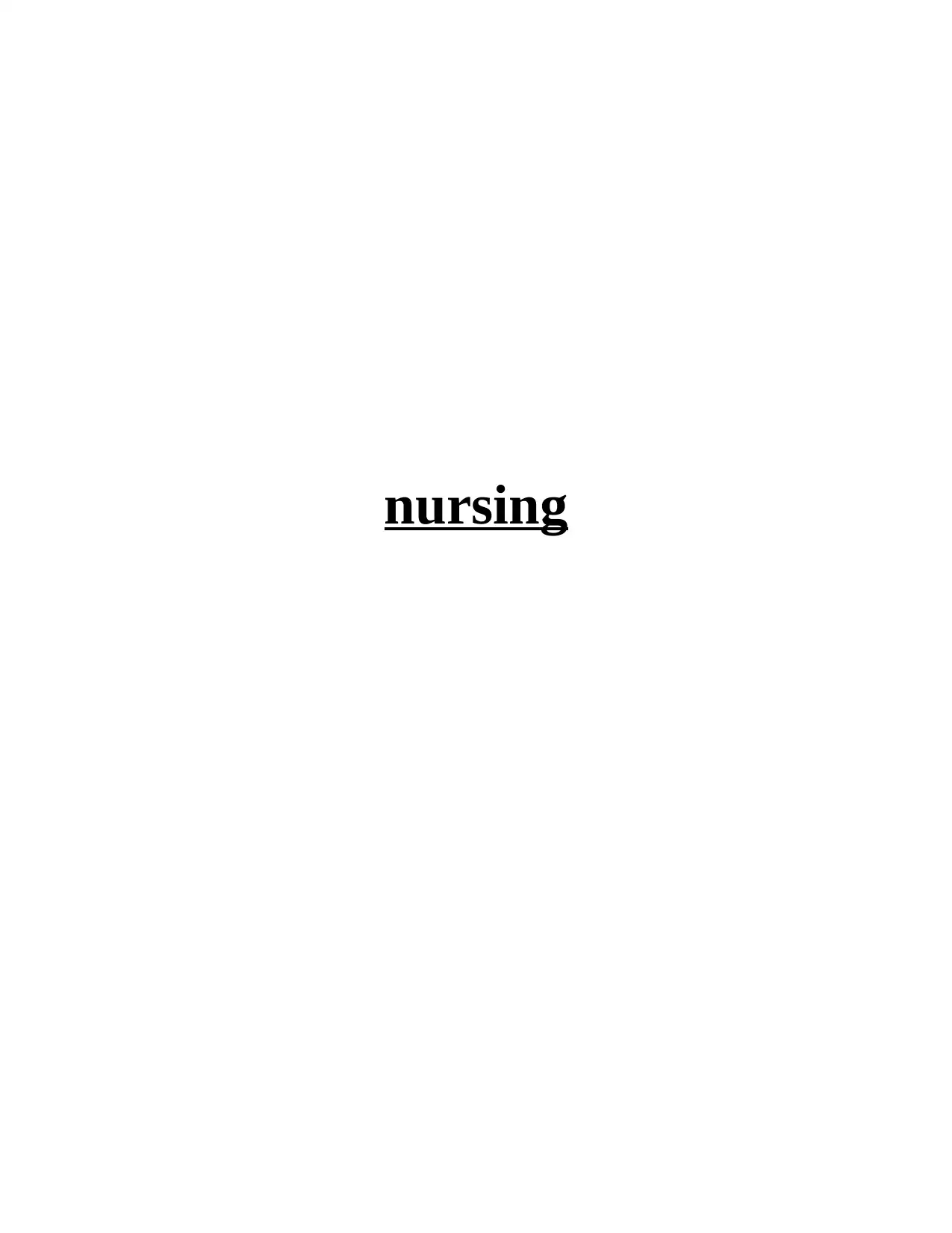
nursing
Paraphrase This Document
Need a fresh take? Get an instant paraphrase of this document with our AI Paraphraser
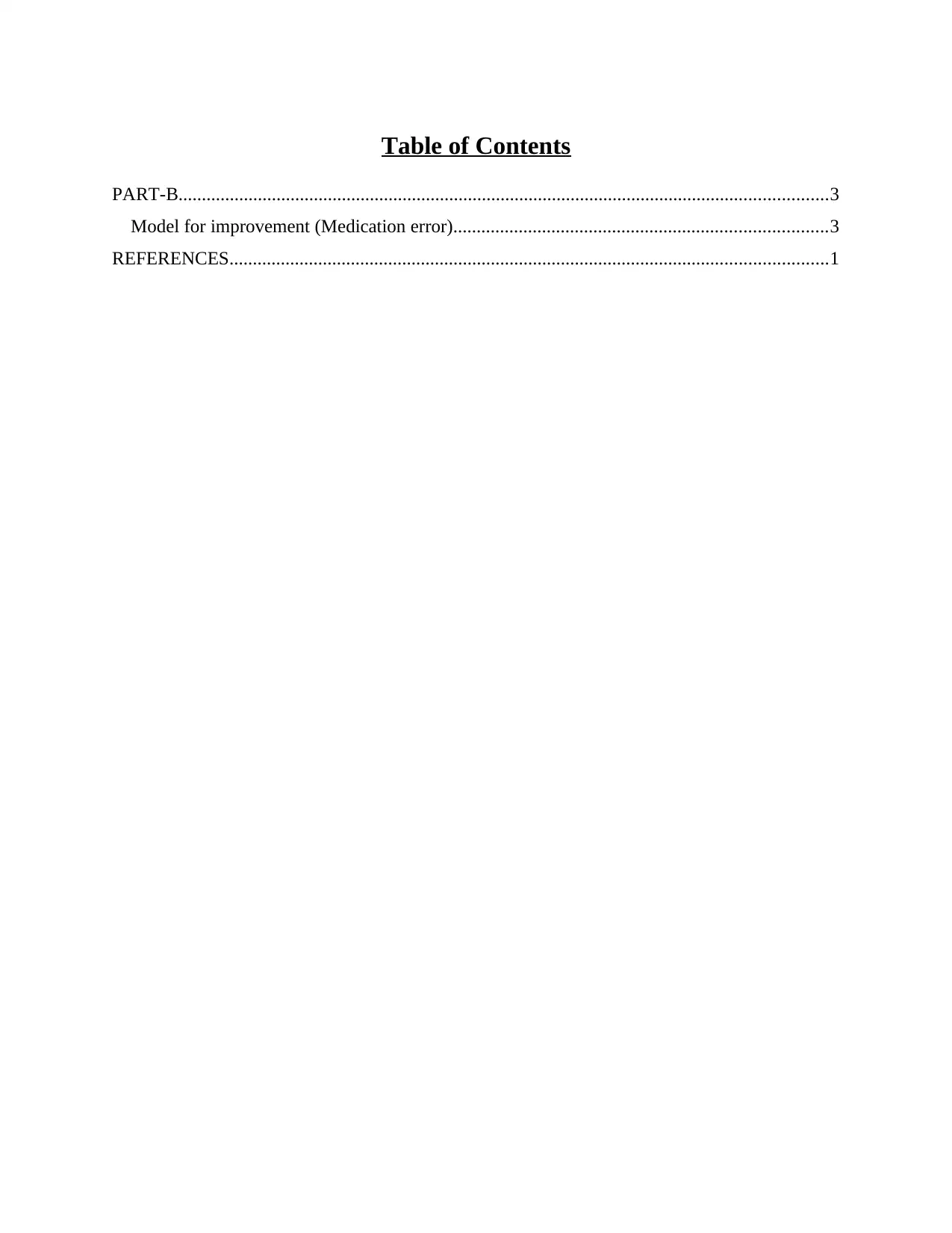
Table of Contents
PART-B...........................................................................................................................................3
Model for improvement (Medication error)................................................................................3
REFERENCES................................................................................................................................1
PART-B...........................................................................................................................................3
Model for improvement (Medication error)................................................................................3
REFERENCES................................................................................................................................1
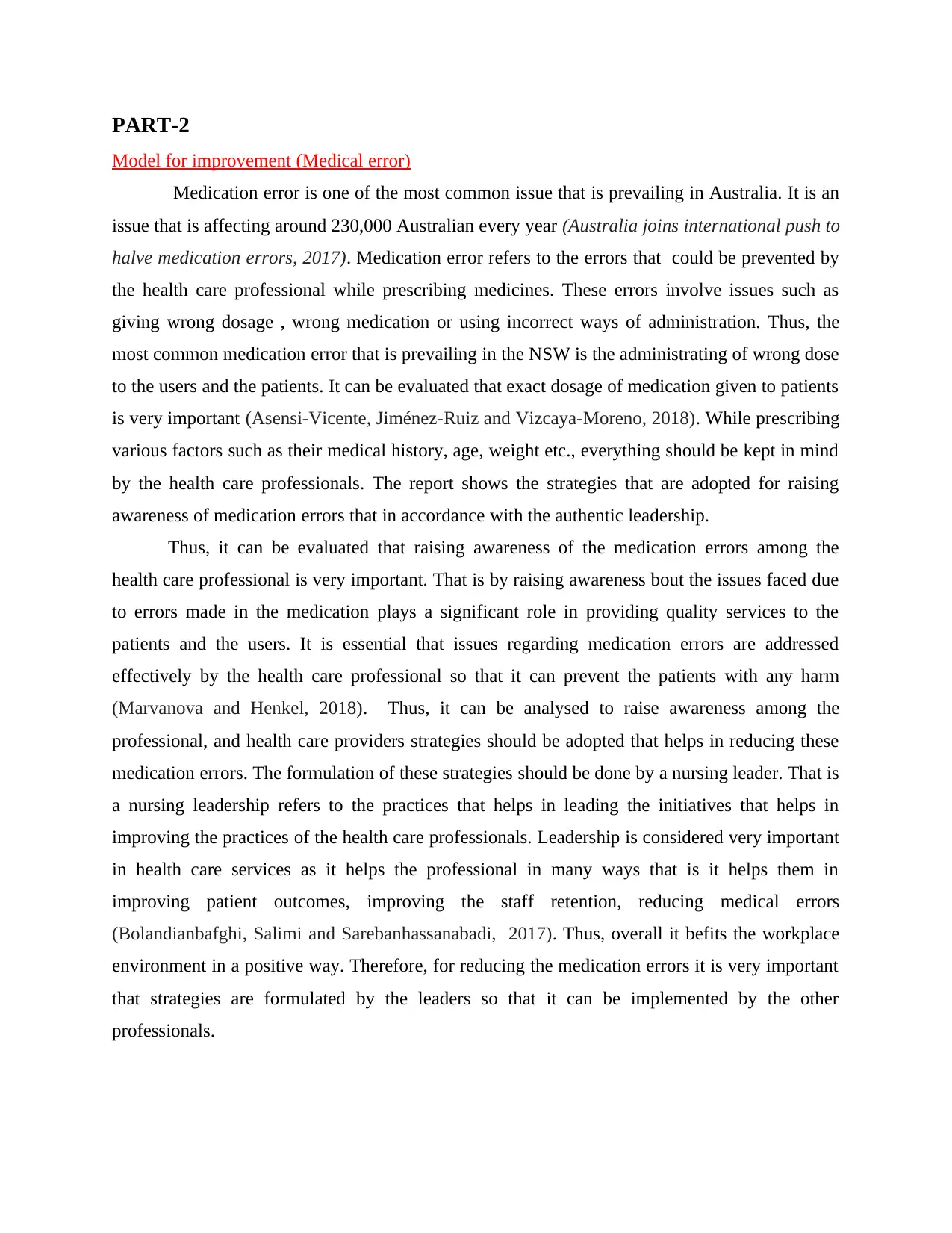
PART-2
Model for improvement (Medical error)
Medication error is one of the most common issue that is prevailing in Australia. It is an
issue that is affecting around 230,000 Australian every year (Australia joins international push to
halve medication errors, 2017). Medication error refers to the errors that could be prevented by
the health care professional while prescribing medicines. These errors involve issues such as
giving wrong dosage , wrong medication or using incorrect ways of administration. Thus, the
most common medication error that is prevailing in the NSW is the administrating of wrong dose
to the users and the patients. It can be evaluated that exact dosage of medication given to patients
is very important (Asensi-Vicente, Jiménez-Ruiz and Vizcaya-Moreno, 2018). While prescribing
various factors such as their medical history, age, weight etc., everything should be kept in mind
by the health care professionals. The report shows the strategies that are adopted for raising
awareness of medication errors that in accordance with the authentic leadership.
Thus, it can be evaluated that raising awareness of the medication errors among the
health care professional is very important. That is by raising awareness bout the issues faced due
to errors made in the medication plays a significant role in providing quality services to the
patients and the users. It is essential that issues regarding medication errors are addressed
effectively by the health care professional so that it can prevent the patients with any harm
(Marvanova and Henkel, 2018). Thus, it can be analysed to raise awareness among the
professional, and health care providers strategies should be adopted that helps in reducing these
medication errors. The formulation of these strategies should be done by a nursing leader. That is
a nursing leadership refers to the practices that helps in leading the initiatives that helps in
improving the practices of the health care professionals. Leadership is considered very important
in health care services as it helps the professional in many ways that is it helps them in
improving patient outcomes, improving the staff retention, reducing medical errors
(Bolandianbafghi, Salimi and Sarebanhassanabadi, 2017). Thus, overall it befits the workplace
environment in a positive way. Therefore, for reducing the medication errors it is very important
that strategies are formulated by the leaders so that it can be implemented by the other
professionals.
Model for improvement (Medical error)
Medication error is one of the most common issue that is prevailing in Australia. It is an
issue that is affecting around 230,000 Australian every year (Australia joins international push to
halve medication errors, 2017). Medication error refers to the errors that could be prevented by
the health care professional while prescribing medicines. These errors involve issues such as
giving wrong dosage , wrong medication or using incorrect ways of administration. Thus, the
most common medication error that is prevailing in the NSW is the administrating of wrong dose
to the users and the patients. It can be evaluated that exact dosage of medication given to patients
is very important (Asensi-Vicente, Jiménez-Ruiz and Vizcaya-Moreno, 2018). While prescribing
various factors such as their medical history, age, weight etc., everything should be kept in mind
by the health care professionals. The report shows the strategies that are adopted for raising
awareness of medication errors that in accordance with the authentic leadership.
Thus, it can be evaluated that raising awareness of the medication errors among the
health care professional is very important. That is by raising awareness bout the issues faced due
to errors made in the medication plays a significant role in providing quality services to the
patients and the users. It is essential that issues regarding medication errors are addressed
effectively by the health care professional so that it can prevent the patients with any harm
(Marvanova and Henkel, 2018). Thus, it can be analysed to raise awareness among the
professional, and health care providers strategies should be adopted that helps in reducing these
medication errors. The formulation of these strategies should be done by a nursing leader. That is
a nursing leadership refers to the practices that helps in leading the initiatives that helps in
improving the practices of the health care professionals. Leadership is considered very important
in health care services as it helps the professional in many ways that is it helps them in
improving patient outcomes, improving the staff retention, reducing medical errors
(Bolandianbafghi, Salimi and Sarebanhassanabadi, 2017). Thus, overall it befits the workplace
environment in a positive way. Therefore, for reducing the medication errors it is very important
that strategies are formulated by the leaders so that it can be implemented by the other
professionals.
⊘ This is a preview!⊘
Do you want full access?
Subscribe today to unlock all pages.

Trusted by 1+ million students worldwide
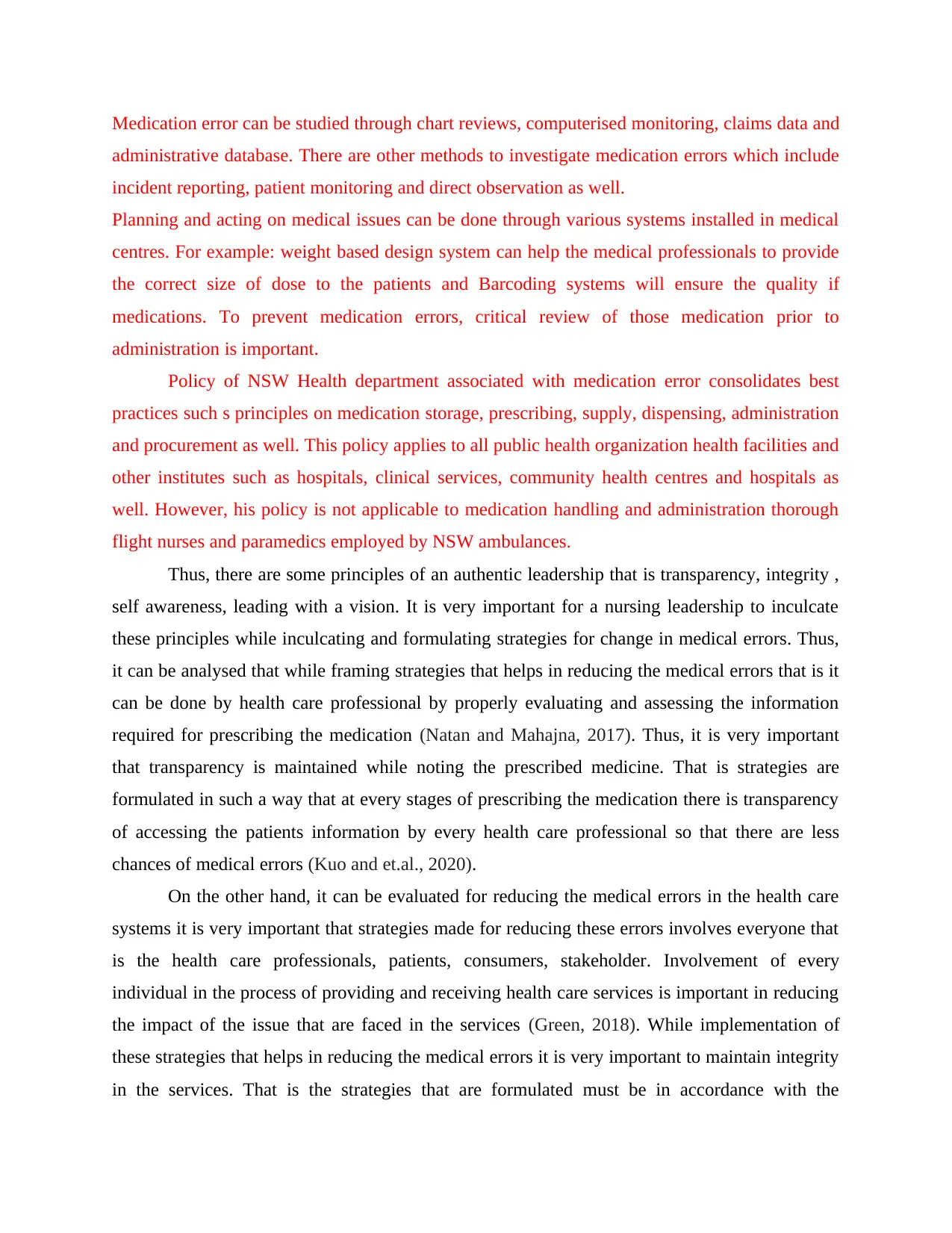
Medication error can be studied through chart reviews, computerised monitoring, claims data and
administrative database. There are other methods to investigate medication errors which include
incident reporting, patient monitoring and direct observation as well.
Planning and acting on medical issues can be done through various systems installed in medical
centres. For example: weight based design system can help the medical professionals to provide
the correct size of dose to the patients and Barcoding systems will ensure the quality if
medications. To prevent medication errors, critical review of those medication prior to
administration is important.
Policy of NSW Health department associated with medication error consolidates best
practices such s principles on medication storage, prescribing, supply, dispensing, administration
and procurement as well. This policy applies to all public health organization health facilities and
other institutes such as hospitals, clinical services, community health centres and hospitals as
well. However, his policy is not applicable to medication handling and administration thorough
flight nurses and paramedics employed by NSW ambulances.
Thus, there are some principles of an authentic leadership that is transparency, integrity ,
self awareness, leading with a vision. It is very important for a nursing leadership to inculcate
these principles while inculcating and formulating strategies for change in medical errors. Thus,
it can be analysed that while framing strategies that helps in reducing the medical errors that is it
can be done by health care professional by properly evaluating and assessing the information
required for prescribing the medication (Natan and Mahajna, 2017). Thus, it is very important
that transparency is maintained while noting the prescribed medicine. That is strategies are
formulated in such a way that at every stages of prescribing the medication there is transparency
of accessing the patients information by every health care professional so that there are less
chances of medical errors (Kuo and et.al., 2020).
On the other hand, it can be evaluated for reducing the medical errors in the health care
systems it is very important that strategies made for reducing these errors involves everyone that
is the health care professionals, patients, consumers, stakeholder. Involvement of every
individual in the process of providing and receiving health care services is important in reducing
the impact of the issue that are faced in the services (Green, 2018). While implementation of
these strategies that helps in reducing the medical errors it is very important to maintain integrity
in the services. That is the strategies that are formulated must be in accordance with the
administrative database. There are other methods to investigate medication errors which include
incident reporting, patient monitoring and direct observation as well.
Planning and acting on medical issues can be done through various systems installed in medical
centres. For example: weight based design system can help the medical professionals to provide
the correct size of dose to the patients and Barcoding systems will ensure the quality if
medications. To prevent medication errors, critical review of those medication prior to
administration is important.
Policy of NSW Health department associated with medication error consolidates best
practices such s principles on medication storage, prescribing, supply, dispensing, administration
and procurement as well. This policy applies to all public health organization health facilities and
other institutes such as hospitals, clinical services, community health centres and hospitals as
well. However, his policy is not applicable to medication handling and administration thorough
flight nurses and paramedics employed by NSW ambulances.
Thus, there are some principles of an authentic leadership that is transparency, integrity ,
self awareness, leading with a vision. It is very important for a nursing leadership to inculcate
these principles while inculcating and formulating strategies for change in medical errors. Thus,
it can be analysed that while framing strategies that helps in reducing the medical errors that is it
can be done by health care professional by properly evaluating and assessing the information
required for prescribing the medication (Natan and Mahajna, 2017). Thus, it is very important
that transparency is maintained while noting the prescribed medicine. That is strategies are
formulated in such a way that at every stages of prescribing the medication there is transparency
of accessing the patients information by every health care professional so that there are less
chances of medical errors (Kuo and et.al., 2020).
On the other hand, it can be evaluated for reducing the medical errors in the health care
systems it is very important that strategies made for reducing these errors involves everyone that
is the health care professionals, patients, consumers, stakeholder. Involvement of every
individual in the process of providing and receiving health care services is important in reducing
the impact of the issue that are faced in the services (Green, 2018). While implementation of
these strategies that helps in reducing the medical errors it is very important to maintain integrity
in the services. That is the strategies that are formulated must be in accordance with the
Paraphrase This Document
Need a fresh take? Get an instant paraphrase of this document with our AI Paraphraser
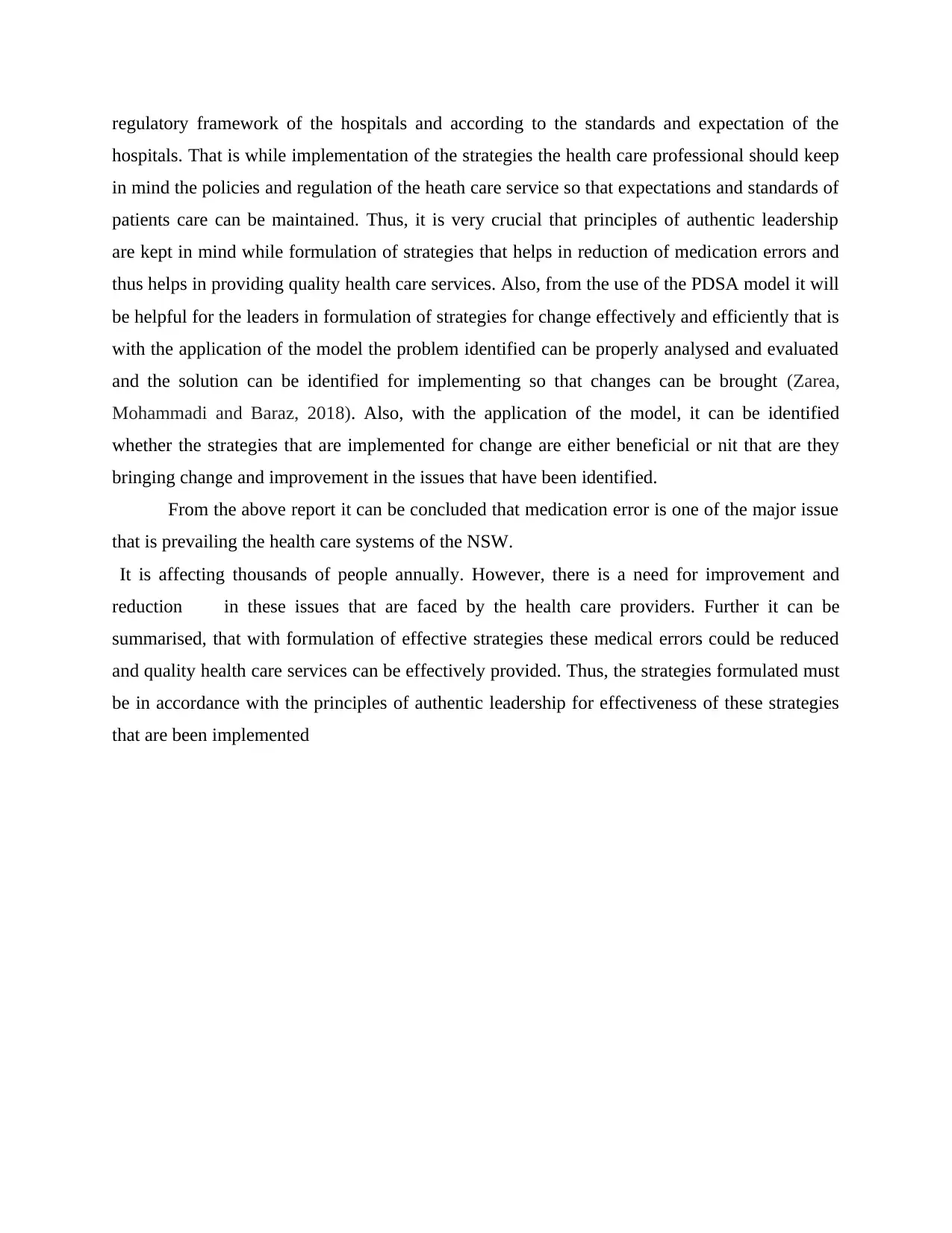
regulatory framework of the hospitals and according to the standards and expectation of the
hospitals. That is while implementation of the strategies the health care professional should keep
in mind the policies and regulation of the heath care service so that expectations and standards of
patients care can be maintained. Thus, it is very crucial that principles of authentic leadership
are kept in mind while formulation of strategies that helps in reduction of medication errors and
thus helps in providing quality health care services. Also, from the use of the PDSA model it will
be helpful for the leaders in formulation of strategies for change effectively and efficiently that is
with the application of the model the problem identified can be properly analysed and evaluated
and the solution can be identified for implementing so that changes can be brought (Zarea,
Mohammadi and Baraz, 2018). Also, with the application of the model, it can be identified
whether the strategies that are implemented for change are either beneficial or nit that are they
bringing change and improvement in the issues that have been identified.
From the above report it can be concluded that medication error is one of the major issue
that is prevailing the health care systems of the NSW.
It is affecting thousands of people annually. However, there is a need for improvement and
reduction in these issues that are faced by the health care providers. Further it can be
summarised, that with formulation of effective strategies these medical errors could be reduced
and quality health care services can be effectively provided. Thus, the strategies formulated must
be in accordance with the principles of authentic leadership for effectiveness of these strategies
that are been implemented
hospitals. That is while implementation of the strategies the health care professional should keep
in mind the policies and regulation of the heath care service so that expectations and standards of
patients care can be maintained. Thus, it is very crucial that principles of authentic leadership
are kept in mind while formulation of strategies that helps in reduction of medication errors and
thus helps in providing quality health care services. Also, from the use of the PDSA model it will
be helpful for the leaders in formulation of strategies for change effectively and efficiently that is
with the application of the model the problem identified can be properly analysed and evaluated
and the solution can be identified for implementing so that changes can be brought (Zarea,
Mohammadi and Baraz, 2018). Also, with the application of the model, it can be identified
whether the strategies that are implemented for change are either beneficial or nit that are they
bringing change and improvement in the issues that have been identified.
From the above report it can be concluded that medication error is one of the major issue
that is prevailing the health care systems of the NSW.
It is affecting thousands of people annually. However, there is a need for improvement and
reduction in these issues that are faced by the health care providers. Further it can be
summarised, that with formulation of effective strategies these medical errors could be reduced
and quality health care services can be effectively provided. Thus, the strategies formulated must
be in accordance with the principles of authentic leadership for effectiveness of these strategies
that are been implemented
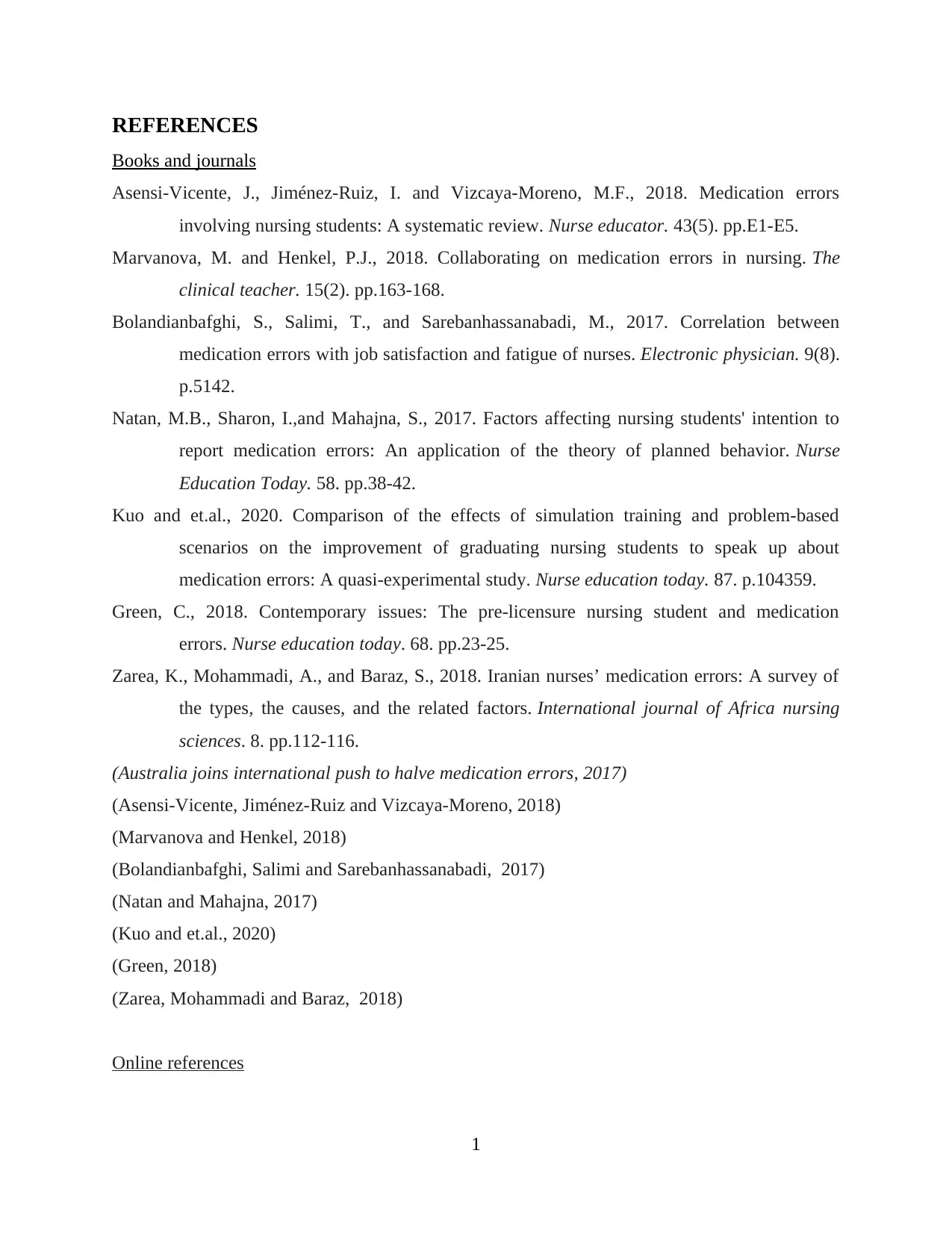
REFERENCES
Books and journals
Asensi-Vicente, J., Jiménez-Ruiz, I. and Vizcaya-Moreno, M.F., 2018. Medication errors
involving nursing students: A systematic review. Nurse educator. 43(5). pp.E1-E5.
Marvanova, M. and Henkel, P.J., 2018. Collaborating on medication errors in nursing. The
clinical teacher. 15(2). pp.163-168.
Bolandianbafghi, S., Salimi, T., and Sarebanhassanabadi, M., 2017. Correlation between
medication errors with job satisfaction and fatigue of nurses. Electronic physician. 9(8).
p.5142.
Natan, M.B., Sharon, I.,and Mahajna, S., 2017. Factors affecting nursing students' intention to
report medication errors: An application of the theory of planned behavior. Nurse
Education Today. 58. pp.38-42.
Kuo and et.al., 2020. Comparison of the effects of simulation training and problem-based
scenarios on the improvement of graduating nursing students to speak up about
medication errors: A quasi-experimental study. Nurse education today. 87. p.104359.
Green, C., 2018. Contemporary issues: The pre-licensure nursing student and medication
errors. Nurse education today. 68. pp.23-25.
Zarea, K., Mohammadi, A., and Baraz, S., 2018. Iranian nurses’ medication errors: A survey of
the types, the causes, and the related factors. International journal of Africa nursing
sciences. 8. pp.112-116.
(Australia joins international push to halve medication errors, 2017)
(Asensi-Vicente, Jiménez-Ruiz and Vizcaya-Moreno, 2018)
(Marvanova and Henkel, 2018)
(Bolandianbafghi, Salimi and Sarebanhassanabadi, 2017)
(Natan and Mahajna, 2017)
(Kuo and et.al., 2020)
(Green, 2018)
(Zarea, Mohammadi and Baraz, 2018)
Online references
1
Books and journals
Asensi-Vicente, J., Jiménez-Ruiz, I. and Vizcaya-Moreno, M.F., 2018. Medication errors
involving nursing students: A systematic review. Nurse educator. 43(5). pp.E1-E5.
Marvanova, M. and Henkel, P.J., 2018. Collaborating on medication errors in nursing. The
clinical teacher. 15(2). pp.163-168.
Bolandianbafghi, S., Salimi, T., and Sarebanhassanabadi, M., 2017. Correlation between
medication errors with job satisfaction and fatigue of nurses. Electronic physician. 9(8).
p.5142.
Natan, M.B., Sharon, I.,and Mahajna, S., 2017. Factors affecting nursing students' intention to
report medication errors: An application of the theory of planned behavior. Nurse
Education Today. 58. pp.38-42.
Kuo and et.al., 2020. Comparison of the effects of simulation training and problem-based
scenarios on the improvement of graduating nursing students to speak up about
medication errors: A quasi-experimental study. Nurse education today. 87. p.104359.
Green, C., 2018. Contemporary issues: The pre-licensure nursing student and medication
errors. Nurse education today. 68. pp.23-25.
Zarea, K., Mohammadi, A., and Baraz, S., 2018. Iranian nurses’ medication errors: A survey of
the types, the causes, and the related factors. International journal of Africa nursing
sciences. 8. pp.112-116.
(Australia joins international push to halve medication errors, 2017)
(Asensi-Vicente, Jiménez-Ruiz and Vizcaya-Moreno, 2018)
(Marvanova and Henkel, 2018)
(Bolandianbafghi, Salimi and Sarebanhassanabadi, 2017)
(Natan and Mahajna, 2017)
(Kuo and et.al., 2020)
(Green, 2018)
(Zarea, Mohammadi and Baraz, 2018)
Online references
1
⊘ This is a preview!⊘
Do you want full access?
Subscribe today to unlock all pages.

Trusted by 1+ million students worldwide
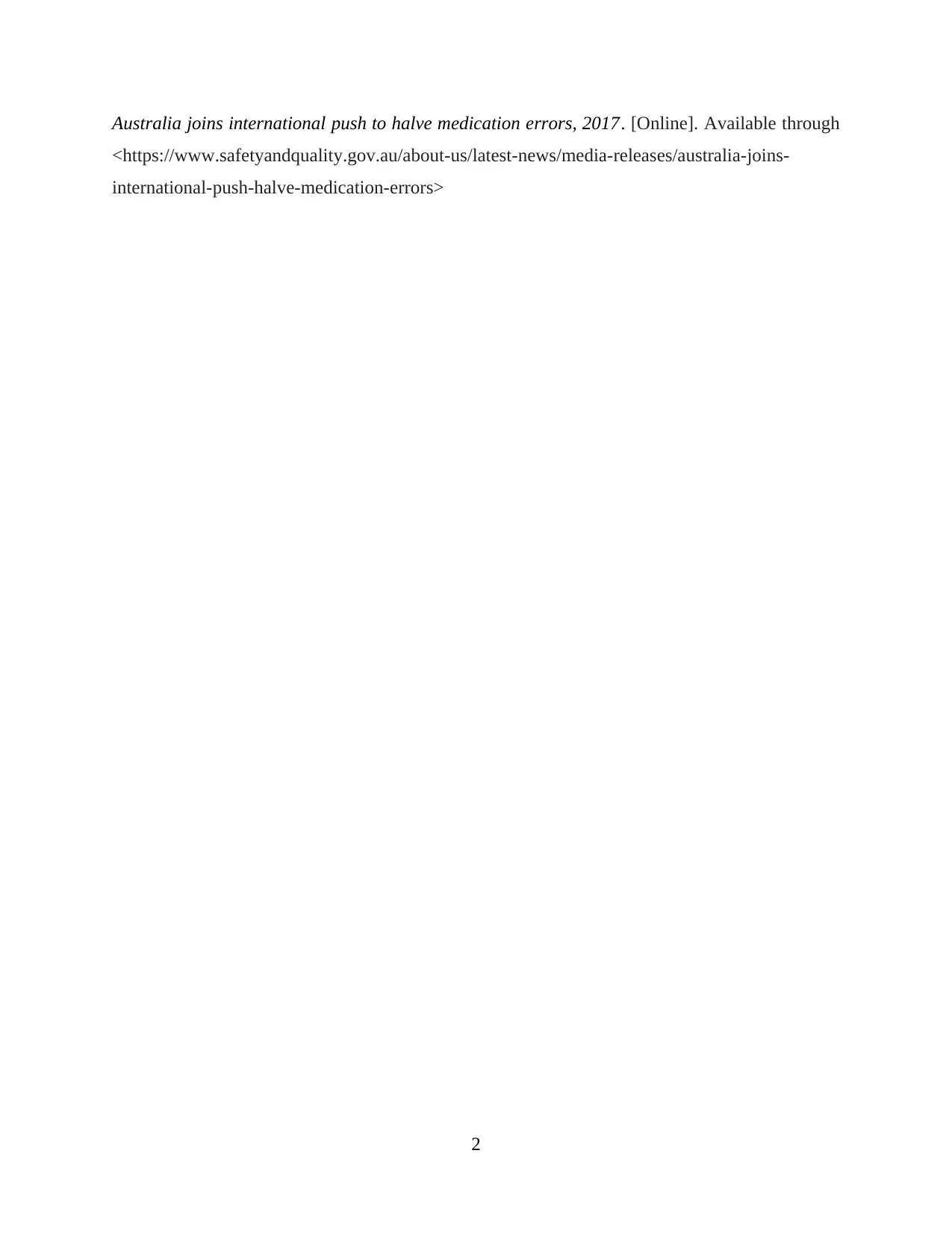
Australia joins international push to halve medication errors, 2017. [Online]. Available through
<https://www.safetyandquality.gov.au/about-us/latest-news/media-releases/australia-joins-
international-push-halve-medication-errors>
2
<https://www.safetyandquality.gov.au/about-us/latest-news/media-releases/australia-joins-
international-push-halve-medication-errors>
2
1 out of 7
Related Documents
Your All-in-One AI-Powered Toolkit for Academic Success.
+13062052269
info@desklib.com
Available 24*7 on WhatsApp / Email
![[object Object]](/_next/static/media/star-bottom.7253800d.svg)
Unlock your academic potential
Copyright © 2020–2026 A2Z Services. All Rights Reserved. Developed and managed by ZUCOL.





